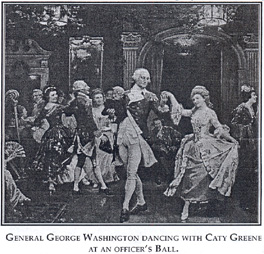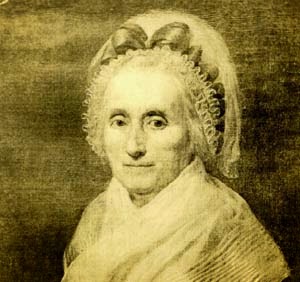Mary
I posted a previous blog about the greatest (sorta) mother of the American Revolution: Mary Ball Washington. This steely widow birthed the ages "indispensable man" George Washington. She was kind of a Beeyoche, but her stubborn and strong-willed nature clearly passed on to George. The result: a leader who although flawed managed to adapt to adversity, rally diverse peoples, and keep a nation (and himself) together for eight long years until the millennium's most unlikely victory came to being. Despite their often strained relationship, Washington doted on his mother. We can be thankful to the woman who raised a son to become the leader of a new nation and the idol of most of his age.
 |
| Mary Ball Washington's fire and stubbornness passed on to her noted son |
Martha
I truly think the lord above was having fun with these two mothers who influenced, molded, and simply made George Washington the man he was. Martha Custis was a wealthy widow when she married George. She was also his senior and was already a mother. George adopted her children as his own and doted on the family he married into. Martha was short and tended in middle age to stout. But although Washington was admired by the most glamorous women in the hemisphere, Martha was his lodestone. Her strength in maintaining his farm and family enabled him to ride off from Mount Vernon to return a long eight years later. But he could not remain apart from Martha that long. Almost every winter he requested she leave their farm and join him in winter quarter where she became the surrogate mother of his officers and men.
 |
| Martha as a young woman |
Abigail
Abigail Smith is most widely known as Abigail Adams. The great John Adams book by David McCullough and the resultant TV series has made her the most renowned of "First Mothers." Adams admired and encouraged Abigail's outspokenness and intelligence. She supported him by running the family farm, raising their children, listening to him, and trying to help him with his problems. Despite her own bouts with illness, she gave birth to five children. One daughter, Susanna, born in 1768, lived for only a year. Besides being the bedrock of the founding father who would become America's second (and first controversial) president, Abigail was mother to the nation's sixth president - their son John Quincy Adams.
 |
| Abigail's letters bolstered her husband while informing him of family doings |
Caty
Nathaniel Greene is considered the second greatest (and for some the greatest) commander in the American army. Catharine Littlefield married Nathaniel Greene in 1774 at the tender age of nineteen. With her husband marching off to war a year later she was thrust abruptly into the role of head of household. Eager to be with her husband, she joined Gen. Greene at his military headquarters whenever possible. Over the course of the war (and shortly after), Catharine had five children. Conflicted by the caring for her children but longing to be with her husband, Caty (as she was also called) settled on a compromise. In order to have a normal family life when conditions allowed, she brought her young children with her to camp. At other times she left them in the care of family or friends. It was during these separations that Caty most felt the effects of the war upon her family. She was a staple at winter quarters and her presence had a positive effect not only on her husband but the other officers and the commander in chief himself - they were often dance partners.









